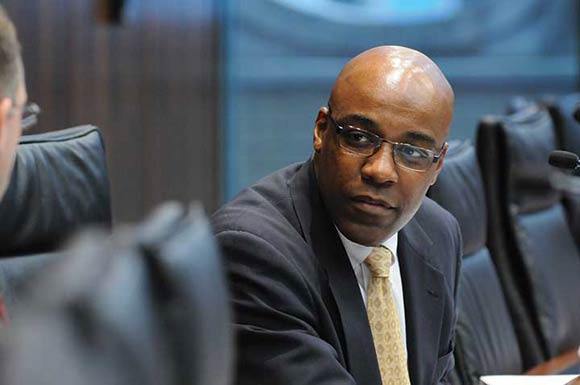
Photo: Brandy Renfro
Kwame Raoul is ready for the next step.
It’s been eight years since he succeeded Barack Obama in the Illinois Senate as a Democrat representing the 13th District on Chicago’s South Side. And just as now-President Obama moved on after eight years in Springfield, Sen. Raoul (LAW ’93) is considering his next move as well. Perhaps it will be a run for a statewide office such as attorney general, should current attorney general Lisa Madigan run for governor, or a run for the United States Senate if Dick Durbin retires in 2014, as Durbin has hinted.
If it’s the U.S. Senate job, then Sen. Raoul would again be following in President Obama’s footsteps. Sen. Raoul isn’t committed to using his predecessor’s career as a blueprint, though; in fact, he was leaning toward a private-sector career until he received some unexpected encouragement from his teenage son last year.
It was a surprise because the same son, as a 7-year-old in 2006, told his dad he hoped he wasn’t reelected because he wanted him to spend more time at home. Six years later, the son’s tune had changed. “He said, ‘Dad, when you first started, I didn’t particularly like you being gone so much. But over the years, I‘ve come to appreciate the work that you’ve done, and I think it’s kind of cool when people come up to you on the street and say thank you,” Sen. Raoul recalls. “He started crying, I started crying, and I made an about-face right then.”
“[Sen. Raoul] is willing to take positions that are politically difficult if he knows it’s the right thing to do, and that says a lot about his character and integrity. He’s a true statesman of the legislature.” —Former Sen. john Millner
So while Sen. Raoul did change jobs in 2012, joining the Chicago office of Milwaukee-based law firm Quarles and Brady as a partner in the labor and employment law group, it was understood that he would continue to devote much of his time to public service. (He had a similar arrangement with his former employer, Detroit-based law firm Miller Canfield.)
Sen. Raoul’s legacy in Springfield extends far beyond labor law. In 2011, three significant bills he sponsored were signed into law by Governor Pat Quinn: one abolished the death penalty in Illinois; another reformed Illinois’s workers’ compensation system; and a third, the Illinois Voting Rights Act, guards against political gerrymandering.
Sen. Raoul has also established a reputation for working across political lines, forging friendships with Republican colleagues such as John Millner from west suburban Carol Stream, who retired in January 2013.
“We’re able to listen to each other, able to craft meaningful dialogue, and that leads to meaningful legislation,” says Millner. Sen. Raoul “is willing to take positions that are politically difficult if he knows it’s the right thing to do, and that says a lot about his character and integrity. He’s a true statesman of the legislature.”
In 2008, Sen. Raoul took a group of 50 Chicagoans to rural, downstate Jefferson County as part of an exchange program that he designed with the Illinois Farm Bureau. Sen. Raoul and his guests visited a local school, hospital, and even a shooting range. A few weeks later, a similar group from Jefferson County visited Raoul’s district in Chicago. Then the 100 participants gathered for a town-hall-style meeting. Sen. Raoul says the experience helped him understand the gun-control debate in a more nuanced manner, and that it was meaningful to interact with gun-rights advocates outside the polarized atmosphere of Springfield.
That spirit of compromise hasn’t always defined the Illinois Senate during Sen. Raoul’s tenure, however. His early days in the state legislature under then-Governor Rod Blagojevich were marked by stalemate. The memory of that feeling of ineffectiveness influenced Sen. Raoul’s decision not to seek Jesse Jackson Jr.’s seat in the U.S. House of Representatives. He briefly considered a run, but concluded, “I don’t want to go to the bottom of a seniority base of a hierarchy that is dysfunctional, in the minority, where potentially I’m never going to be able to advance any legislation or public policy during my entire tenure.”
Sen. Raoul grew up in Chicago’s Hyde Park and Kenwood neighborhoods; his parents are immigrants from Haiti, and Sen. Raoul serves on the board of International Child Care (ICC), a nonprofit that promotes health care for children in Haiti and the Dominican Republic. He traveled to Haiti in 2011 with a team from Chicago’s Lurie Children’s Hospital in hopes of rebuilding an ICC-run children’s hospital in Port-au-Prince that was destroyed by a 2010 earthquake. The Chicago team is returning to Haiti in 2013 for the next phase of the project.
The cross-cultural partnership is reminiscent of the Jefferson County exchange, and points to the sort of bridge-building that Sen. Raoul hopes will define his political career. That strategy isn’t traditional Chicago politics, of course—but neither is Sen. Raoul.